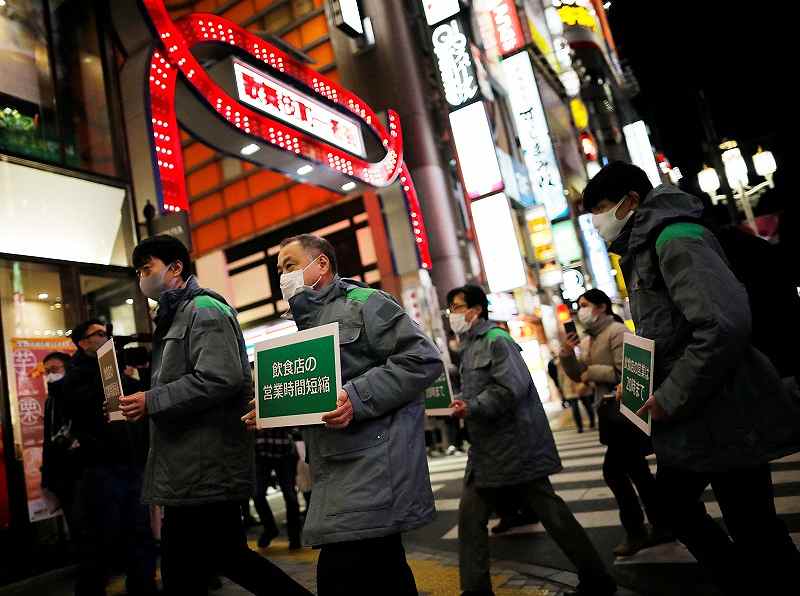
Staff members of the Tokyo metropolitan government wearing protective masks hold placards during a march as they call for people to stay home and shortening business hours to restaurants or bars in Shinjuku Ward,Tokyo, in January 2021.
2:00 JST, December 10, 2022
Fraudulent claims for coronavirus pandemic-related subsidies worth more than ¥500 million had been identified as of September, The Yomiuri Shimbun has learned.
Eateries that closed or shortened their business hours to mitigate the spread of COVID-19 in areas subject to emergency or quasi-emergency restrictions were eligible to receive the support.
Since April 2021, businesses have been able to receive up to ¥200,000 per day, depending on sales. To receive the subsidy, eateries were required to implement infection-prevention measures, such as improving ventilation and installing partitions. Eateries that fraudulently claimed they had implemented measures were also found to have received subsidies.
Prefectural governments have asked all eateries that fraudulently received handouts to return the money. However, more than ¥300 million has yet to be returned.
With prefectures still receiving information about fraudulent claims, it is thought that the amount uncovered so far is just the tip of the iceberg.
The financial assistance was meant to help eateries that observed prefectural requests to close or shorten their hours, amid concerns that businesses could go bust.
The handout was paid without on-site inspections, in principle.
The Yomiuri Shimbun asked all prefectures about the subsidy payments and found that, as of the end of September, in at least 561 cases, ¥503 million in subsidies was received by establishments that submitted fraudulent declarations at the time of their applications in 20 prefectures.
Cases of simple errors such as incomplete documentation or misunderstandings were not included.
About ¥165 million has been returned at the request of prefectures — ¥338 million remains unrecovered.
The fraudulent cases involved businesses that did not comply with requests to shorten hours or close; forged or falsified restaurant business licenses; or submitted applications for eateries that did not exist.
Fraudulent claims in Tokyo totaled about ¥335 million, the highest among prefectures. About ¥266 million has yet to be returned.
The second highest was Saitama Prefecture at ¥45.37 million, with ¥34.14 million unrecovered, followed by Fukuoka Prefecture at ¥28.95 million, with ¥15.23 million yet to be returned.
The metropolitan government’s emphasis on swift cash handouts and the large number of restaurants in Tokyo were likely factors in the significantly higher amount of fraudulent claims logged in the capital.
About ¥6.7 trillion in subsidies was paid out in about 6.23 million cases nationwide.
Prefectural governments launch probes when fraud is discovered through police investigations or reports from the public. The total tally of fraudulent cases is expected to increase in the future.
The highest amount fraudulently received by a single business was about ¥59 million in a case uncovered by the Tokyo metropolitan government.
The business was a take-out outlet, and such establishments were not eligible for the subsidy. The outlet repeatedly submitted applications with photographs of seating, fraudulent claiming it offered eat-in services.
Increased workloads amid the pandemic meant prefectural governments struggled to conduct appropriate checks.
“The number of applications was enormous. It has been difficult to detect fraud,” a Tokyo Metropolitan government official said.
On Nov.22, the Metropolitan Police Department announced the arrest of a bar owner on suspicion of fraudulently receiving ¥1 million in subsidies.
The man, who is believed to have received more than ¥10 million in subsidies overall, allegedly made fraudulent claims in applications, according to the police.
3rd shot OK’d for 12 and above
The government has decided to lower the minimum age for a third dose of the U.S.-made Moderna COVID-19 vaccine from 18 to 12.
A Health, Labor and Welfare Ministry panel approved the decision at a meeting on Thursday.
The inoculations are expected to be offered free of charge, depending on the outcome of discussions by another panel.
Top Articles in Society
-

Man Infected with Measles Reportedly Dined at Restaurant in Tokyo Station
-

Man Infected with Measles May Have Come in Contact with Many People in Tokyo, Went to Store, Restaurant Around When Symptoms Emerged
-

Woman with Measles Visited Hospital in Tokyo Multiple Times Before Being Diagnosed with Disease
-

Australian Woman Dies After Mishap on Ski Lift in Nagano Prefecture
-

Foreign Snowboarder in Serious Condition After Hanging in Midair from Chairlift in Nagano Prefecture
JN ACCESS RANKING
-

Japan PM Takaichi’s Cabinet Resigns en Masse
-

Japan Institute to Use Domestic Commercial Optical Lattice Clock to Set Japan Standard Time
-

Israeli Ambassador to Japan Speaks about Japan’s Role in the Reconstruction of Gaza
-

Man Infected with Measles Reportedly Dined at Restaurant in Tokyo Station
-

Videos Plagiarized, Reposted with False Subtitles Claiming ‘Ryukyu Belongs to China’; Anti-China False Information Also Posted in Japan
























